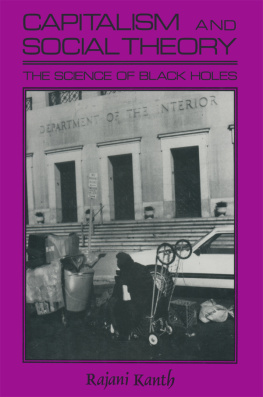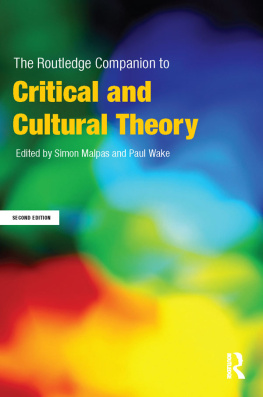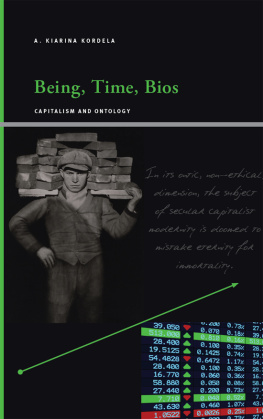CAPITALISM AND
SOCIAL THEORY
First published 1992 by M.E. Sharpe
Published 2015 by Routledge
2 Park Square, Milton Park, Abingdon, Oxon OX14 4RN
711 Third Avenue, New York, NY 10017, USA
Routledge is an imprint of the Taylor & Francis Group, an informa business
Copyright 1992 Taylor & Francis. All rights reserved.
No part of this book may be reprinted or
reproduced or utilised in any form or by any electronic, mechanical, or other means, now known or hereafter invented, including photocopying and recording, or in any information storage or retrieval system, without permission in writing from the publishers.
Notices
No responsibility is assumed by the publisher for any injury and/or damage to persons or property as a matter of products liability, negligence or otherwise, or from any use of operation of any methods, products, instructions or ideas contained in the material herein.
Practitioners and researchers must always rely on their own experience and knowledge in evaluating and using any information, methods, compounds, or experiments described herein. In using such information or methods they should be mindful of their own safety and the safety of others, including parties for whom they have a professional responsibility.
Product or corporate names may be trademarks or registered trademarks, and are used only for identification and explanation without intent to infringe.
First Printing 1992
Library of Congress Cataloguing-in-Publication Data
Rajani Kannepalli Kanth
Capitalism and social theory: the science of black holes / Rajani K. Kanth.
p. cm.
Includes bibliographical references and index.
ISBN 1-56324-069-6 (c). ISBN 1-56324-070-x (p)
1. CapitalismSocial aspects. I. Title.
| HB501.R224 1992 | 91-36533 |
| 306.342dc20 | CIP |
ISBN 13: 9781563240706 (pbk)
ISBN 13: 9781563240690 (hbk)
For Cory, Antara, and Indrina
CONTENTS
Capitalism and Social Theory:
The Nexus of Praxis: An Introduction
About the Author
Acknowledgments
This book is a compilation of various vignettes, of the vital fragments that have made up my intellectual life, in a journey begun in more hopeful times a full twenty-two years ago at the Delhi School of Economics, in whose superlative department of Social Anthropology I first made acquaintance with social theory on a scale, and with an intensity, since unmatched. From there, I moved to the Jawaharlal Nehru University, another unpretentious salon of real learning, this time at the opposite end of the classroom as a teacher, ostensibly in the sociology of politics. And then it was on to Columbia University, New York, and finally to the New School for Social Research, a student again in a town that epitomizes, at least to this alien observer from afar, the very antipodes of the intellectual life, a sordid gutter of urban waste, glitz, and dementia where, all but unknowing, I went through a collapse of the senses from which I am yet to fully recover. At any rate, in that blight, in that rank and venal ethos, sexist, racist, and misanthropic as it was, I studied political economyin the library, and in the street, cursing the madness that had made me give up the fair messuages and pleasances of New Delhi for the cacophonic nightmare of Manhattan. Since then, the parched but peaceful mountains of Utah have been my muses, in airy contrast to the septic vapors of the East Coast; in turn, now, in this haven of quiet, I was to add philosophy (a stint in Oxford putting me on to the genius of Roy Bhaskar) and feminist theory to my researchesboth as phenomenally revelatory areas of inquiry as my early excursions in Marx, Freud, Levi-Strauss, and (later) Derrida. This book must bear bemused witness to all of these extended lucubrations. Homage is due, however, to the founts of faith sustaining such labors: firstly, to the rich intellectual life of New Delhi whose uncompromising qualities nurtured my early beginnings, nourishing the conviction that truth was beyond care or compromise; and secondly to all of my students, toadies, humbugs, and gems inclusive, from New Delhi to New York to Salt Lake City, who have been, for me, almost, the happiest family I have ever been proud to call my own in all of these long, harsh years of exile. In a different key, I offer humble appreciation for the utterly selfless, and loving, care and concern bestowed upon this work, above and beyond any call of duty, by the truly inimitable Barbara Thayer of M.E. Sharpemay her tribe increase!and for the generous license granted by Richard Bartel, who first saw virtue in my efforts at a very preliminary stage. Finally, grace is owed my wife, Cory, who sat verily like patience on a monument, smiling at the many griefs of this tristful enterprise.
Rajani Kanth
Capitalism and Social Theory:
The Nexus of Praxis
Today, it is the resilience of capitalism that has attracted the attention of thoughtful intellectuals in the face of the dramatic self-dissolving collapse of East Bloc socialism, assisted as much by the plain facts of current history as by the cacophonic barrage of precapitalist propaganda meted out by the various governmental and parastatal organs devoted to such matters by either overt or covert official definition. The critics of capitalism, socialist or notespecially the less secure among themare either on the verge ofor have already taken the plunge intocapitulation, looking rather shamefaced in the discovery of having, in their own minds, lived the Big Lie for so long. Votaries of socialism are in retreat, each spilling into the other, rewriting their own failed programmes, and discovering new lesions in Marx that would have been heresy to admit but ten years ago. The Left has taken a tumble and the disarray is both disheartening and pathetic to behold.1
To those who take the longer view, however, recent events are far less climactic, and a lot less definitive of the shape of things to come. In the celebration of the post-war boom (the so-called Fordism of academic jargon), it might be recalled that similar joys were expressed with more than mere carelessness by scholars who might have known better; Daniel Bells prediction of the end of ideology (or Charles Reich singing of the greening of America) being only a notorious example or two from a whole field of such sprouts, the beatific visions exploded only by the unbelievable outbreak of revolts against world capitalism worldwide that marked the later sixties. Of a sudden, the buoyant system took ill and the reckless party was over by the time the seventies rolled in. Reports of the demise of anticapitalist struggle proved hopelessly premature and the capitalist roller coaster slid off the rails in more than one situation, in both the first and third worlds.
Equally reminiscentand instructiveis the earlier epoch of growth and high jinks (the twenties) and then crisis (the thirties), when the exhilaration of the roaring twenties turned abruptly into the dismay of the tumbling thirties with only a worldwide conflagration providing the stirrup for a renewed bout of accumulation. The point couldnt be simplen to judge capitalist successor failure!(materially or ideologically) by its marginal performance is to surrender judgment to the vagaries of the present situation. The system is infinitely changeable (crisis prone) and success is not necessarily followed by more of the same. Social theory of the more unreflective kind, right or left, accordingly, will find itself unsupportably molded by altering historical experience, reflecting every twist and turn of empirical events to a point of incoherence. Both vulgar Marxism and bourgeois ideology share this same glaring weakness of being both ahistorical and altogether empiricist in their pronouncements. The simple truth is quite otherwise: neither has capitalism succeededthe unemployment figures of Britain, Germany, and the United States currently bear ample and healthy warningnor has socialism failed except for certain variants never established by popular consent. All we are seeing is a profound restructuring of both in response to challenges both internal and external to each. The East-West struggle is far from having ended; and indeed the North-South struggle is only just beginning2with European civilization (exclusive of the former USSR) apparently having temporarily sewn up its breaches and achieved closure.








